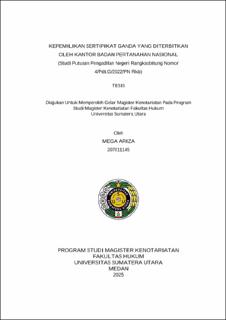| dc.description.abstract | Dual certificates are a critical issue in Indonesia’s land law system, systematically disrupting certainty in land ownership. The Decision of the Rangkasbitung District Court No. 4/Pdt.G/2022/PN Rkb illustrates the complexity of land ownership conflicts caused by administrative weaknesses at the National Land Agency (BPN) in the certificate process, revealing the urgent need for systemic reform in the management of national land assets. This study aims to examine the legal regulations governing the issuance, and an analysis of the Rangkasbitung District Court Decision No. 4/Pdt.G/2022/PN Rkb regarding dual certificate ownership.
This research is a normative legal research with a descriptive analytical nature, using a case approach to examine the issue of dual certificate ownership. The research was conducted through a literature study by collecting primary, secondary, and tertiary legal materials, supported by interviews at BPN Deli Serdang. Data analysis was performed qualitatively.
The results of the study found that a comprehensive review of the issuance of land ownership certificates and dual certificates in Indonesia reveals the complexity of land law issues involving various critical dimensions. Based on an analysis of Government Regulation No. 24 of 1997 and empirical practice, it was found that the potential for dual certificates arises from systemic weaknesses such as poor data recording, document forgery practices, and limited coordination between agencies. The National Land Agency (BPN) bears a complex legal responsibility, including in-depth verification before issuing certificates, compensation provision, annulment of invalid certificates, and the imposition of administrative sanctions. The legal decisions, particularly Decision No. 4/Pdt.G/2022/PN Rkb, reveals fundamental weaknesses judicial reasoning, where a rigid textual approach tends to ignore the complex history of rights transfer and the factual dynamics of land ownership, potentially creating legal uncertainty and substantive injustice for the parties involved in land disputes. | en_US |


